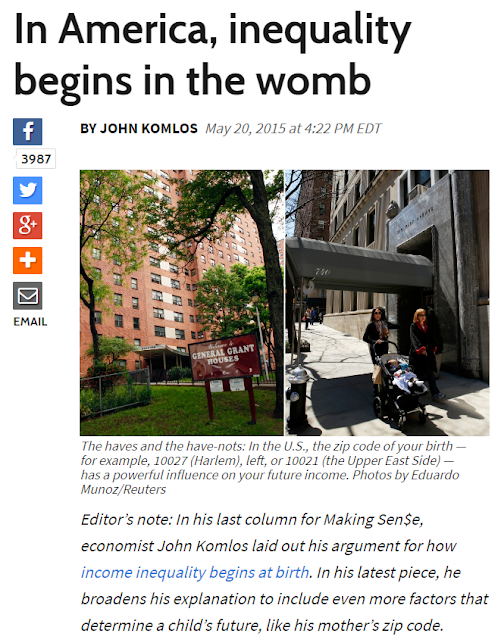Poverty's Effect on Education Starts Inside the Womb
Children born in poor families have limited opportunities for learning during the preschool years. This is one reason why economically disadvantaged children are often less prepared for kindergarten and first grade. Poverty, however, harms education long before the toddler years. Poverty's damaging effects are already at work inside the womb. For this reason, economist John Komlos makes the claim that "In America, inequality begins in the womb":
One parameter that higlights the effects of poverty inside the womb is a child's birth weight. Children born in poor families are more likely to have low birth weight (less than 2.5 kilograms or 5.5 pounds). In Korea, the likelihood of a low birth weight is four times greater in poor families. How a low birth rate affects education has also been examined recently in a study in Copenhagen. This recent work published in Pediatrics looks at intelligence at three adult ages (19, 28 and 50 years old) and extracts its dependence on birth weight. In order to tease out how intelligence correlates with birth weight, adjustments have been made to take into account other possible confounding factors such as gender, mother's age, socioeconomic status, gestation period, birth order, and a smoking mother. The study concludes that there is indeed a strong association between a child's birth weight and intelligence in young adulthood into midlife. The results at 28 years old are shown below:
 |
| Above copied from PBS Newshour |
 |
| Above graph based on Birth Weight and Intelligence in Young Adulthood and Midlife Trine Flensborg-Madsen, Erik Lykke Mortensen Pediatrics Jun 2017, 139 (6) e20163161; DOI: 10.1542/peds.2016-3161 |
Children born at 3.0-3.5 Kg are chosen as reference in the above graph. Children born at 3.5 Kg on average have IQ scores 5.3 points higher than those born at less than 2.5 Kg. For the same data, one can likewise use socioeconomic status of parents as the category and the difference in IQ scores between the poorest and the wealthiest is about 15 IQ points, suggesting that the birth weight alone does have a significant effect on intelligence in adult life. It is obvious then that addressing problems in basic education must include those nine months between conception and birth.
Comments
Post a Comment